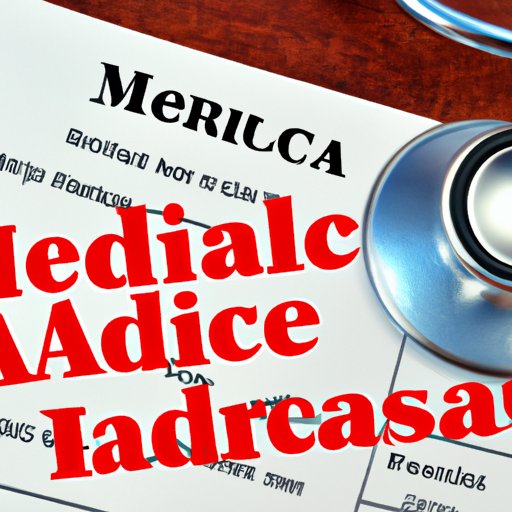
Introduction
As adults approach age 65, Medicare often becomes an important topic of discussion. With so many different parts and plans available, it can be difficult to understand what is covered and what is not. One common question that arises is whether or not Medicare Part A is free at age 65. This article will provide a comprehensive guide to Medicare Part A and answer this important question, so readers can make informed decisions about their healthcare options.
Understanding Medicare Part A: A Comprehensive Guide for Those Turning 65
Medicare Part A is a federal health insurance program that provides coverage for hospital stays, skilled nursing care, hospice care, and some home healthcare services. The program is available to most United States citizens and legal residents who are 65 years of age or older, as well as younger individuals with certain disabilities.
Enrollment in Medicare Part A is automatic for those who have already begun receiving Social Security or Railroad Retirement benefits. For others, there is an enrollment process that should be completed three months before the month of their 65th birthday. This can be done online, by phone, or by visiting a Social Security office.
Is Medicare Part A Free at Age 65?
One important question that arises for those turning 65 is whether or not Medicare Part A is free. The answer is yes, for most people. Individuals who have worked and paid Medicare taxes for at least 10 years (or 40 quarters) are typically eligible for premium-free Part A coverage. Even those who do not meet this requirement may be able to obtain coverage, but they may need to pay a monthly premium.
The Benefits of Enrolling in Medicare Part A at Age 65
Enrolling in Medicare Part A at age 65 can provide a number of benefits. One key advantage is cost savings. With Medicare coverage, individuals generally pay less for hospital stays and skilled nursing care. The program can also help protect against the high costs of medical treatment that can occur as people age.
There are many real-world examples of situations where Medicare Part A has made a difference. For example, it can help individuals pay for expensive treatments such as chemotherapy and costly hospital stays. It can also help older adults manage chronic health conditions and provide important access to preventative care.
Five Common Misconceptions About Medicare Part A at Age 65
There are several common misconceptions about Medicare Part A, including the belief that it covers all healthcare costs. While the program provides significant benefits, it does not cover everything. For example, it does not cover routine vision care or hearing aids. It also does not cover long-term care on its own.
Another common misconception is that applying for Medicare Part A is a complicated, confusing process. However, it can often be done quickly and easily online, by phone, or by visiting a Social Security office.
Who Qualifies for Free Medicare Part A Coverage at Age 65
Most people who have worked and paid Medicare taxes for at least 10 years are eligible for premium-free Part A coverage. Those who do not meet this requirement may still be able to obtain coverage but may need to pay a monthly premium. There are also some individuals who may be automatically enrolled, such as those receiving Social Security or Railroad Retirement benefits.
Navigating the enrollment process can be challenging, but Medicare provides helpful resources to guide people through the process. Additionally, it is important to make sure that all required paperwork is completed and submitted on time to avoid any potential roadblocks.
Comparing Medicare Parts A and B: Is Part A Really Free at Age 65?
While Medicare Part A is generally free for most people, there are additional costs associated with other parts of the program. Medicare Part B, which covers doctor’s visits, outpatient care, and preventative services, comes with a monthly premium that can vary based on income and other factors.
It is important to compare and contrast the different parts of Medicare to determine what is best for each individual’s healthcare needs and budget. This will help people make informed decisions about which parts to enroll in and how much they are willing to pay for coverage.
Understanding the Costs and Benefits of Medicare Part A: Is it Worth the Investment?
While Medicare Part A does come with some costs, such as deductibles and copayments, many individuals find that it is well worth the investment. The program provides important financial protection against the high costs of medical care as people age. It also provides peace of mind for individuals and their families, knowing that they are covered in case of a medical emergency.
Conclusion
As people approach age 65, Medicare becomes an important consideration. Medicare Part A is a valuable program that provides coverage for hospital stays, skilled nursing care, hospice care, and some home healthcare services. While many individuals are eligible for premium-free coverage, it is important to understand the benefits and potential costs associated with the program. By taking advantage of Medicare Part A benefits, individuals can enjoy peace of mind and financial protection as they age.





